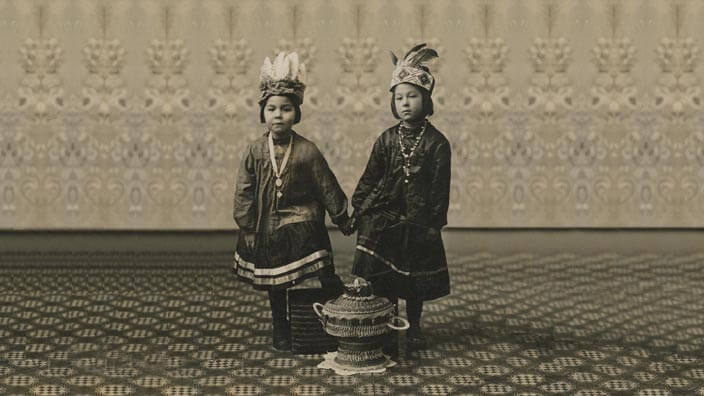Waban-Aki: People from Where the Sun Rises
by Alanis Obomsawin

About the Film
In this feature-length documentary from Alanis Obomsawin, the filmmaker returns to the village where she was raised to craft a lyrical account of her own people. After decades of tirelessly recording others’ stories, she focuses this film on her own.
Waban-Aki: People from Where the Sun Rises
2006 | 1 h 44 min
Waban-Aki: People from Where the Sun Rises, by Alanis Obomsawin, provided by the National Film Board of Canada
BIG IDEAS with Film Unit: The Indian Act and Indigenous Peoples’ Rights
Time required: 5-6 lessons
Grade(s): 6-12
Unit Overview:
This guide has been created to help teachers and students to use Alanis Obomsawin’s documentary film Wabanaki: People from Where the Sun Rises as a primary source of knowledge about Indigenous peoples’ lives and their struggles and interactions with the Canadian legal system. Obomsawin recounts this story through a lyrical narrative of her own hometown and her own people. After decades of tirelessly recording others’ stories, she focuses this film on her own.
Teachers in Law 12 may wish to expand and use this film along with two other films of Obomsawin; Kanehsatake, 270 Years of Resistance and Richard Cardinal: Cry from a Diary of a Metis Child, both available for free on the NFB website. Viewed together, students could then thoroughly analyze and understand the impacts of the judicial system on Indigenous peoples across Canada.
BIG IDEAS with Film Inquiry Questions
These questions can be adapted into a worksheet to fill in during or after film screenings:
- Who is the filmmaker, what are they known for?
- What is this film about? What are the main messages the filmmaker wanted us to understand?
- If you could ask the filmmaker a question, what would you ask?
- What were you thinking as you finished watching the film?
- What part of the story told by the film was the most powerful or memorable? Why?
- Sometimes fiction and documentary films explore important social or political issues. Describe any specific social or political issues that affect the story. How do these issues impact the people we saw in the film?
- Documentaries can show us new ways of understanding an issue or topic in our world. Describe an aspect of the film that showed you something you hadn’t seen before, caused you to think in a new way, or helped you understand something more thoroughly than before.
- What particularly appealed to you in the cinematic presentation of the film, such as how particular scenes, images, or sounds were presented?
- For documentary films: what conventions does the filmmaker incorporate in this film? Do they use voiceover, re-enactments, archival footage, interviews?
- Are there multiple viewpoints? Do they agree or contradict each other?
- Who are the dominant voices in the documentary? Are they official sources such as government representatives, or are they experts of another kind? Or are they everyday people from the street? What is their connection to the documentary’s subject?
Questions and Connections
Key questions can be used before film screening or after, to help students see connections between their own lives and the ideas and perspectives they see in Obomsawin’s films. Select from questions and tailor them to your grade level.
- How much do you know about First Nations’ history? Do you know anything already about the Truth and Reconciliation Commission of Canada?
- Were you born in Canada? If not, where were you born? How important to you is that country’s culture, heritage, and language to you and your family?
- Do you speak more than one language? If so, do you feel more connected to another nation’s culture (and history) when you speak in that language? Do you speak that language with senior family members, such as aunts and uncles, grandparents, and great-grandparents?
- Do your friends have cultural traditions and customs that are visibly and audibly different from those of your family? If so, can you elaborate? Do you participate with your friends and their families during special cultural events? If so, would you like to share some of your thoughts and experiences?
- Have you personally ever felt or experienced a loss of human rights? If so, what happened, and how did you deal with the situation?
- Imagine if somebody took you away from your family/community and you had to live and attend school in a community far away from all your family and friends. How might you feel? What would you do?
- What if you were forbidden from speaking the language you have been speaking since you were a baby? What if you were forced/ordered to learn and speak a new language?
- What types of music do you and your family listen to together? Do you make music together? Have your grandparents shared any music with you? Has your family taught you any particular songs and/or dances? Does having a musical heritage make you feel more connected to the past?